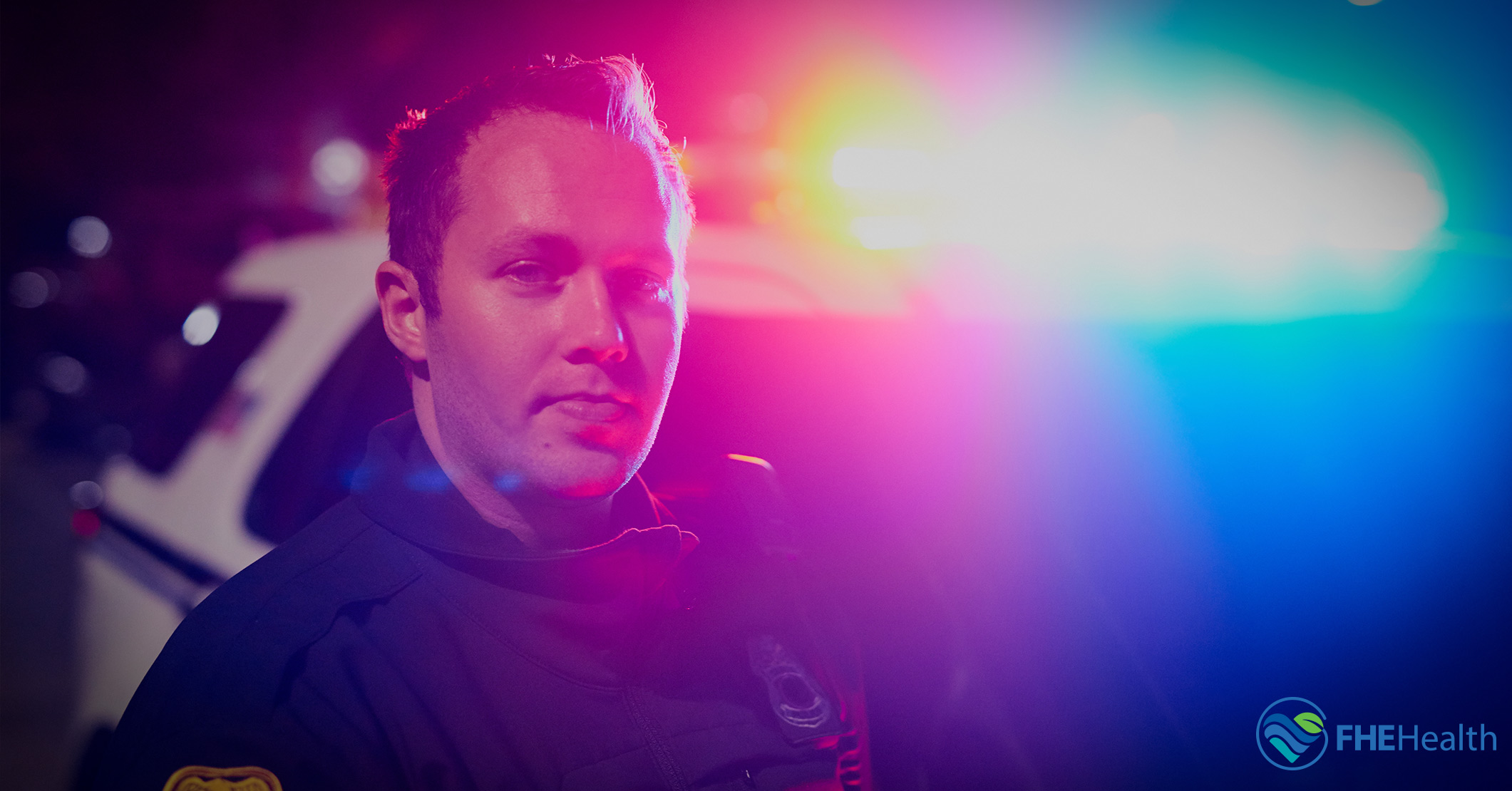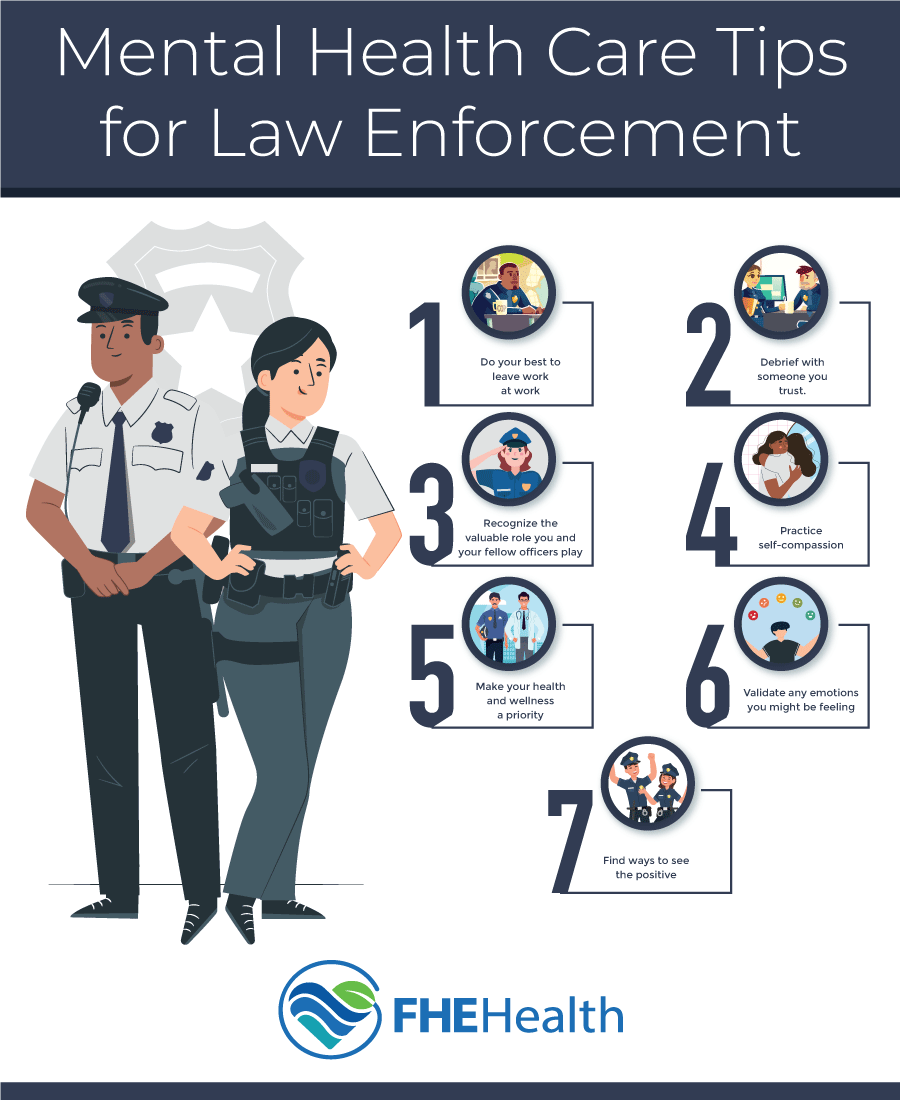
Law enforcement officers are charged with the task of serving and protecting citizens and creating a safe environment for everyone in their communities. Being a police officer can be rewarding, but it also comes with high demands and exposure to trauma. Over time, this can take a severe toll on the officer’s mental health.
What are the Mental Health Challenges in Law Enforcement?
Unfortunately, the mental health of those in law enforcement is often overlooked. As a result, police officers report relatively high rates of depression, anxiety, and post-traumatic stress disorder compared to those in the general population. They’re significantly more likely to die by suicide than in the line of duty, and about a quarter of officers have considered suicide at some point during their careers. Despite the negative impact their job has on their mental health, fewer than 20 percent of law enforcement officers with mental health issues seek professional help.
On top of the job-related challenges police officers face, there are instances in which workplace culture and politics can further exacerbate mental health issues. Police officers don’t always feel empowered to seek treatment for illnesses such as PTSD, depression, and anxiety, and in some cases, they may worry that pursuing treatment could negatively impact their careers. Education about the prevalence of mental illnesses among law enforcement officers, as well as the resources available to them, can give officers the tools they need to seek help.
Is There Stigma and Silence Surrounding Mental Health in Law Enforcement?
Aside from typical barriers such as the availability of providers and financial considerations, the stigmatization of mental health in law enforcement is a significant factor that prevents officers from getting necessary treatment. In 2019, a large police department in Texas’s Dallas-Fort Worth area conducted an anonymous survey to pinpoint the main barriers to mental health services. Based on feedback from over 400 respondents, the department identified four obstacles to care.
Concerns about Confidentiality in the Department
Of the survey’s 434 respondents, only 17 percent of those in law enforcement with a history of mental illness sought professional help. Of those who didn’t seek treatment, many reported interest in mental health services if they were guaranteed confidentiality. This suggests that currently, most officers assume that their mental illness will become public knowledge if they were to seek treatment.
Inability to Recognize the Symptoms of Mental Illness
Mental illness doesn’t always look the way we expect. Along with obvious symptoms such as feelings of burnout or anxiety, social isolation and stress, it can also bring some unexpected physical symptoms such as headaches, back and neck aches, appetite changes, drug and alcohol use, and difficulty sleeping. In some cases, police officers may not seek help for mental illness because the only symptoms they notice are physical and easy to chalk up to the physical demands they face.
The Belief that Mental Health Professionals Don’t Understand Their Line of Work
Police officers face unique challenges related to workplace culture and exposure to dangerous situations. While most people only experience a handful of traumatic events during their lifetimes, police officers encounter these situations on a regular basis. Many erroneously believe that because their experiences are vastly different from a typical client, mental health care professionals may not be trained to help them navigate their unique challenges.
The Belief that Mental Health Issues Make Them Unfit to Serve
Despite the fact that mental illness is common, affecting over a quarter of the nation’s adult population in a given year, police officers may be concerned that the presence of a mental illness may indicate that they’re unfit to serve their communities.
In addition to these key obstacles identified in this study, feedback from similar surveys showed that law enforcement officers perceived a lack of support from management. Officers may be concerned that seeking help for mental health issues could result in them being passed up for promotions or relieved of their typical duties. Even though the mental health of law enforcement officers is at risk nationwide, many officers fear they may lose the respect of their colleagues if they seek help.
How Can Police Departments Encourage Mental Health Support?
Minimizing exposure to danger and trauma isn’t feasible for most police officers, but fortunately, research suggests that consistent access to mental and emotional health training can offset the toll this exposure takes on mental health. There are several ways police departments can foster supportive environments for officers experiencing mental illnesses. This may include:
- Creating an area within the department that provides literature and contact information for mental health resources; this can reduce the stigma while ensuring every officer knows where to turn for help
- Partnering with local or national mental health organizations that specialize in helping officers living with mental illnesses
- Providing training and assistance in handling critical incidents for incoming officers, especially those transferring from a small department to a large one where they’re more likely to be exposed to trauma
- Developing safety protocols for officers experiencing PTSD; special safety plans may be necessary to temporarily reduce an officer’s access to lethal means while also addressing fears related to job loss
The job of a law enforcement officer is unlikely to change, but departments can create supportive environments that offer a safe place to work through job-related traumas.
Breaking the Taboo: Discussing Mental Health in Law Enforcement
One of the most important and effective ways to combat stigmas and break the taboo related to seeking treatment is to participate in ongoing discussions on the mental health of police officers. Departments across the nation are actively seeking ways to address the unique challenges police officers face and provide access to support and information.
For example, some departments in California are partnering with the National Alliance on Mental Illness to create the NAMI COPE program, which provides peer-led, confidential weekly support groups. Other departments have on-staff counselors and psychologists who provide free counseling, and nationwide programs such as Blue H.E.L.P. provide education and advocacy for police officers experiencing PTSD and suicidal thoughts.
Providing Accessible and Confidential Mental Health Resources in Law Enforcement
As public awareness has increased and more research has come out on the mental health of police officers, there’s been an increase in access to field-specific mental health resources. Thanks to the Law Enforcement Mental Health and Wellness Act, which was signed into law in 2018, police departments across the nation have recognized the importance of protecting the mental health challenges police officers face. To promote access to mental health services, departments can connect officers to resources through the U.S. Department of Justice’s Community Oriented Policing Services (COPS) office. Other resources include:
- Crisis Text Line, which has counselors available 24/7 to provide free, confidential services to law enforcement officers
- Safe Call Now, which provides referrals to resources in the community specifically for police officers
- CopLine, a 24/7 resource that connects police officers with trained, retired officers who can help them process job-related trauma
- Addressing Trauma and PTSD in the Line of Duty
In addition to the resources available through their department, police officers can turn to local resources for help with addressing trauma and PTSD. Programs such as Shatterproof from FHE Health provide specialized help for those who deal with trauma and dangerous situations on a regular basis.
There are numerous resources available to law enforcement officers experiencing mental illnesses. Educating officers on the signs and symptoms of mental illness, fostering a supportive environment in local departments, and providing literature on available resources can empower law enforcement officers to access the help they need to continue serving their communities effectively.
To learn more about FHE’s program for police officers and other first responders, contact us today.
More Resources And Support For Heroes In Law Enforcement
- 7 Reasons First Responders Need Specialized Mental Health Treatment and Support
- In Honor of Men and Women in Blue Who Gave Their Lives – Consider the Mental Health Sacrifices That Our Police Are Making
- FHE Health Is Now the Primary Provider of Choice for National Fraternal Organization of Police
- The Real Dangers of Fentanyl Exposure for First Responders
- First Responder Mental Health at Heart of New Partnership







